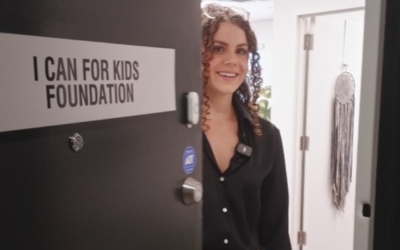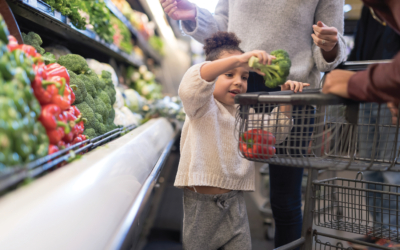This month we’re sharing a personal story from an amazing woman and colleague who has experienced and overcome food insecurity. Andrea’s story is a powerful testament to some of the common challenges faced by many food-insecure families across Alberta. Her experience highlights the modern realities of financial instability caused by relationship breakdown amidst a rising cost of living. Her journey also serves as a poignant reminder of the critical role that income-based community support plays in helping parents overcome adversity to build a better future for their children.
iCAN gained much insight from Andrea’s unique perspective on the lasting emotional toll after years of navigating a fractured system of support. We’re inspired by her transformation from a distressed single parent to a thriving psychologist!
From years of stability to sudden uncertainty
Hello, my name is Andrea. I used to work for one of the I Can for Kids (iCAN) agency partners in Calgary. When the iCAN staff learned that I’ve experienced food insecurity and poverty, they asked me to share my journey with their supporters. My story is not unlike so many of the stories in our city: one of a sudden change of circumstances and the emotional and financial upheaval and challenges those changes bring.
I stayed home to raise my four children for twelve years, a stability that changed overnight when my marriage ended in late 2012. My divorce was a harsh lesson in downward mobility. It was a bitter fight to receive child support, and I worked a full-time job as well as a part-time job on the days the children were with their father. My jobs both paid minimum wage, and they were the only jobs I could find with my employment gap during the time I raised my children.

The emotional price of putting family first
I also needed flexible work hours that allowed me to drop off and pick up my children. They attended the designated school for the neighbourhood their father lived in, but not the area where I lived. I chose to prioritize my kids’ emotional wellbeing even though this greatly limited my employment opportunities for jobs with better pay but less flexible hours.
For the first year, I would take double shifts at my second job which provided 8 hours of overtime, a welcome bump to my finances. Still, every month was a struggle, and I will never forget that first Christmas when my fridge broke down. My credit cards were maxed and I couldn’t afford to replace it. I felt so desperate. That was also the Christmas I had shingles, a virus that often appears with stress.
Paying the hidden costs of subsidized support
I am profoundly grateful for the many subsidized programs we accessed at that time including low-cost bus passes, no-cost dental care for my children, and free tickets to cultural events. I had no hope of being able to pay these expenses on my limited budget. I am thankful AND I think it is important to say that subsidies aren’t free. To reap the benefits from subsidies requires time, energy, and the ability to navigate many complex systems and resources that are supremely taxing when you work multiple jobs and care for children. When I wanted to reach out for support, I had to work within their limited hours of business, which means I had to take time off of work. When you only have two weeks of vacation a year, using up any of those days to access subsidies is disheartening.
There is also a price to pay in dignity: constantly having to prove that my family had it “bad enough” to “deserve” being subsidized. Accessing subsidies is like having another job. One that may or may not pay you at the end of the day. It can feel demeaning and patronizing.
Discovering a path forward
I learned about the iCAN grocery gift card program through my first counselling job at Carya Society of Calgary, a local non-profit that provides subsidized counselling to families and older adults. If I had known about this program, I would have accessed their support during those financially challenging years. I know that poverty isn’t a choice. I know what it means to have to hustle to feed your children. That’s why the iCAN program matters. It provides dignified help when the stakes couldn’t be higher.
I now work as a psychologist. I was fortunate enough to have been able to go back to school and get my master’s degree. The impact of those lean years still lingers, and I am not sure I will ever catch up financially.
Thank you for all you do, I Can for Kids!




